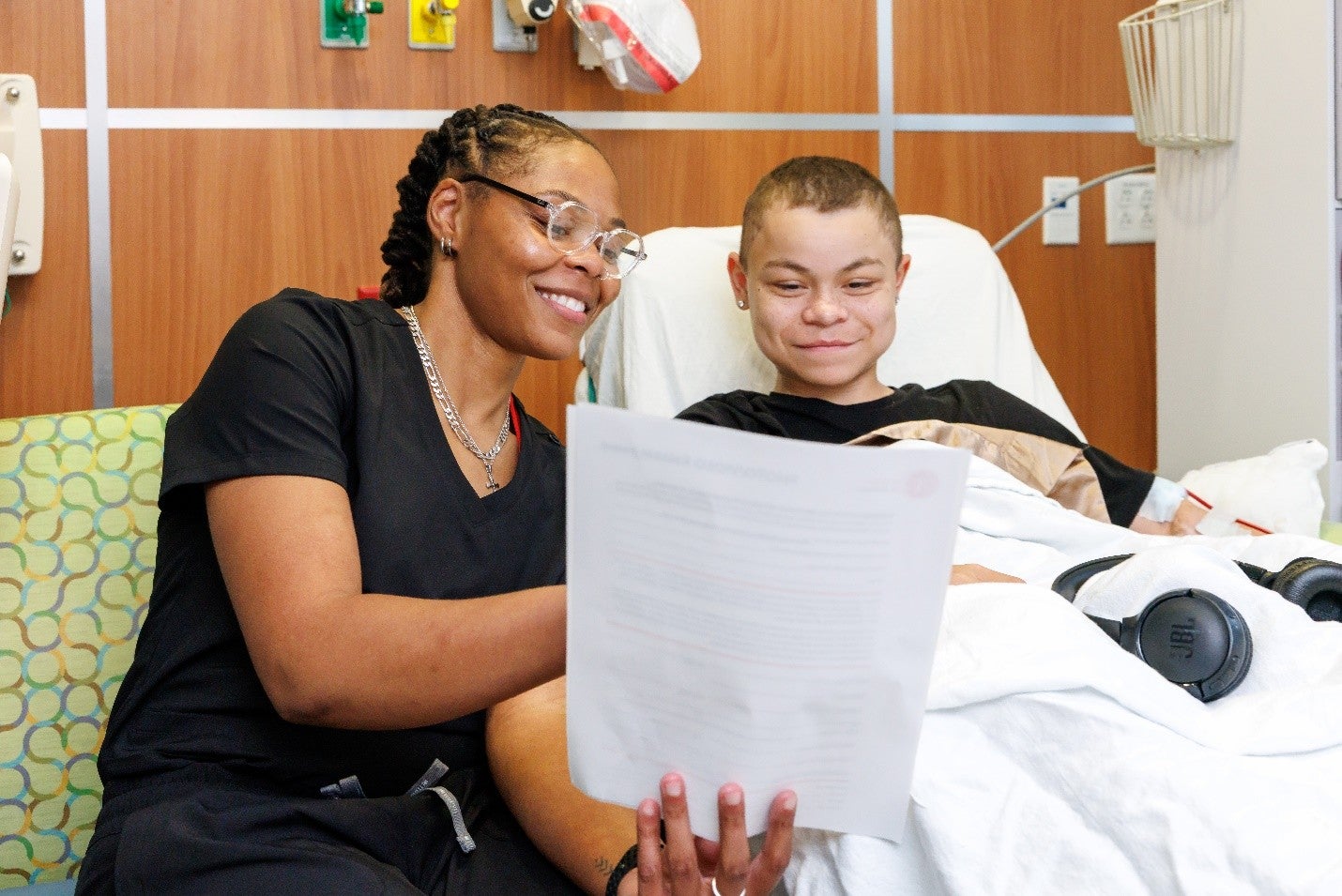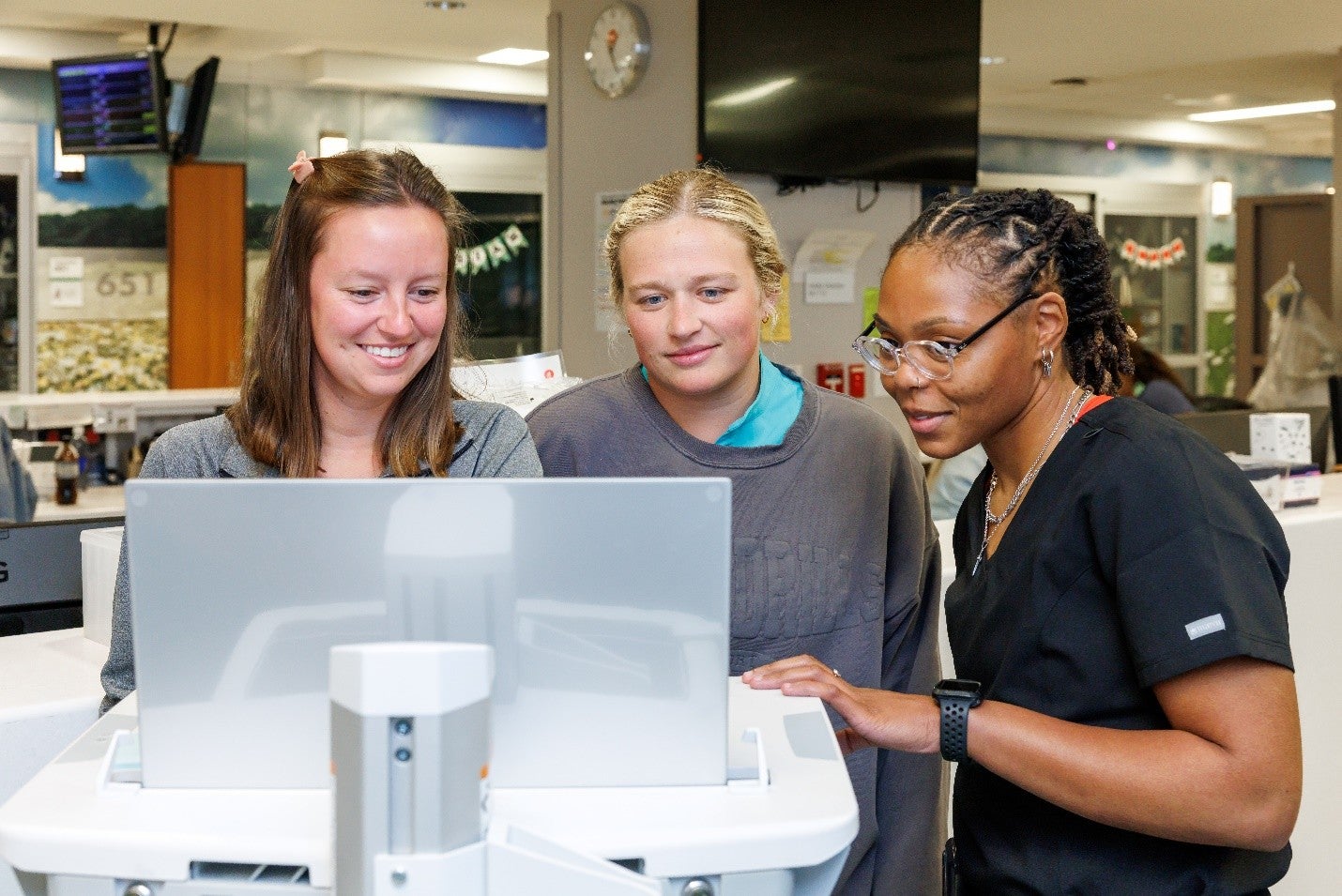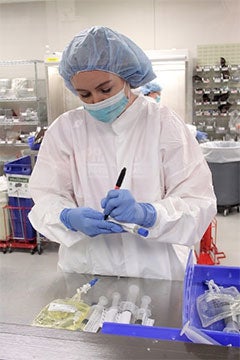Longitudinal Rotations
Ambulatory Care
Ambulatory Care is a required, longitudinal learning experience at Children’s of Alabama. During this experience, residents will rotate through three clinics (2 required and 1 elective), providing pharmaceutical care to pediatric patients receiving chronic outpatient care at the Children’s of Alabama Ambulatory Care Center.
Required clinic experiences are:
Cystic fibrosis
Renal transplant
Elective clinic options include:
Heart Transplant
Liver Transplant
Hematology/Oncology
HIV (adolescent/adult)
Infectious Diseases
Blood and Bone Marrow Transplant
Dialysis
Advanced experiences in required clinics
Additional experiences at resident request
Patient care in the clinic setting is a multidisciplinary approach. Depending on the clinic setting, disciplines on the clinic team include attending physicians, fellow physicians, nurse practitioners, nurses, nurse coordinators, clinical pharmacists, clinical nutritionists, respiratory therapists, social workers, counselors, psychologists, child life therapists, access and retention coordinators, nursing assistants, and access facilitators. Pharmacy residents and other health professionals in training also participate when assigned to ambulatory care. The number of patients seen in each clinic varies. Patients range in age from infants to young adults.
Residents will spend at least 12 weeks in each of the three required clinics, and at least 8 weeks in their elective clinic. The experience requires clinic attendance by the resident, regardless of concurrent rotation responsibilities, one morning or afternoon per week (dependent on the current clinic) from approximately August through June.
Anticoagulation
Anticoagulation is a required, longitudinal learning experience at Children’s of Alabama. Patients receiving anticoagulants may be on any inpatient service in the hospital and may be housed on any unit. Each clinical pharmacist is responsible for providing anticoagulation consultation/assessment for patients followed by his/her clinical team. The clinical pharmacist/resident on call will provide anticoagulation consultation/assessment for patients on a medical service that does not have a clinical pharmacist. Weekend/holiday anticoagulation consultation/assessment duties fall upon the clinical pharmacist/resident covering kinetics unless the clinical pharmacist on the patient’s service is available.
At Children’s of Alabama, pharmacists provide formal anticoagulation consults for every inpatient receiving anticoagulants (including: warfarin, enoxaparin, direct oral anticoagulants (DOACs), argatroban, and non-CRRT/ non-ECMO/ non-MCSD heparin or bivalirudin infusions) or a treatment or prophylactic indication continuing for 24 hours or more. Anticoagulation consultation responsibilities include monitoring for therapeutic dosing of anticoagulants using relevant laboratory measurements, patient education, monitoring for adverse effects, monitoring plan and dosing recommendations, and appropriate documentation of consult related activities no later than the day of patient discharge.
Drug Information
The drug information rotation is a required, longitudinal learning experience at Children’s of Alabama. The focus of this rotation is the provision of drug information to the hospital’s pharmacy, nursing, and medical staff. Some examples of the types of drug information provided include in-services, articles for the pharmacy newsletter, responses to specific drug information questions, and medication utilization evaluations. Residents will be required to provide the following services (assignments may change based resident’s needs):
- Write 2 drug information articles for the pharmacy newsletter
- Respond to any drug information questions assigned during the year, providing formal written responses to at least two drug information requests.
- Complete one medication utilization evaluation
- Complete 3 drug class reviews and/or drug monographs
- Create 2 or revise 4 existing learning modules for the pharmacy department
- Provide an ACPE-approved CE program to Children's of Alabama and UAB pharmacists.
Pharmacokinetics
Clinical Pharmacokinetics (PK) is a required, longitudinal learning experience at Children’s of Alabama. Patients receiving antimicrobials requiring therapeutic drug monitoring (TDM) may be on any inpatient service in the hospital and may be housed on any unit. Each clinical pharmacist is responsible for providing PK consultation/assessment for patients followed by his/her clinical team. The clinical pharmacist/resident on call will provide PK consultation/assessment for patients on a medical service that does not have a clinical pharmacist. On average the on-call pharmacist/resident can expect anywhere between 5-10 patients per day for PK monitoring. Weekend/holiday PK consultation/assessment duties fall upon the clinical pharmacist/resident covering kinetics, unless the clinical pharmacist on the patient’s service is available. On average the weekend/holiday on-call pharmacist/resident can expect anywhere between 20-40 patients per day for PK monitoring.
At Children’s of Alabama, pharmacists provide formal PK consults inpatients receiving antimicrobials requiring TDM (including vancomycin, amikacin, gentamicin, tobramycin, itraconazole, Posaconazole, and voriconazole). PK consultation responsibilities include TDM medication dosing, reviewing/interpreting relevant laboratory values, making recommendations for change of dose or interval, communicating/implementing a plan for subsequent laboratory monitoring, and appropriate documentation of consult related activities on the day the service is provided.
Pharmacy Operations
 The pharmacy operations rotation is a required, longitudinal learning experience at Children’s of Alabama (COA). The pharmacy department of Children's of Alabama provides pharmaceutical care services to inpatients in our 380-bed facility and clinic patients in our outpatient Ambulatory Care Center. Pharmacists in our department work from inpatient pharmacy, from satellites in Hematology/Oncology and Surgery, or in unit-based patient care areas.
The pharmacy operations rotation is a required, longitudinal learning experience at Children’s of Alabama (COA). The pharmacy department of Children's of Alabama provides pharmaceutical care services to inpatients in our 380-bed facility and clinic patients in our outpatient Ambulatory Care Center. Pharmacists in our department work from inpatient pharmacy, from satellites in Hematology/Oncology and Surgery, or in unit-based patient care areas.
Services provided by the pharmacy department at Children's of Alabama include medication preparation and delivery, decisions about medication selection, dosages, routes and methods of administration, medication therapy monitoring, and the provision of medication-related information for other healthcare professionals and patients. Our pharmacy staff respond to codes and level 1 traumas, as well as other emergencies when called upon. The Pharmacy department uses robotic technology to aid in inventory management.
The focus of this rotation is to provide the opportunity for the development of various traditional processing and dispensing skills. Skills will also be developed in operating procedures and the utilization of pharmacy electronic programs, both of which are needed to fulfill the rotation. The pharmacy resident is responsible for assuming dispensing roles in the central pharmacy for oral and IV medication production and dispensing. During this rotation the resident is also expected to revise/write one policy or standard operating procedure and present the revised policy/standard operating procedure at Policy and Procedure meeting. Staffing assignments will be every 3rd weekend, every 3rd Thursday, and other days as assigned to total no more than 20 additional staffing days.
Practice Management

- Perform compliance audits (anticoagulation and controlled substance usage)
- Attend Crucial Conversations class
- Evaluate the medications on one order set for appropriateness for the Order set Review Committee.
- Attend 3 Pharmaceutical Stewardship Committee meetings
- Discuss resources to keep updated on trends and changes within pharmacy and healthcare with the Director of Pharmacy.
- Discuss current changes to laws and regulations and their effect on the Department of Pharmacy with the Director of Pharmacy.
- Discuss the governance of the health care system with the Director of Pharmacy.
- Research Myers/Briggs personality types and discuss
- Research interviewing techniques and discuss
- Participate in residency interviews
- Research regulatory and safety requirements for the Children's of Alabama Department of Pharmacy and have a discussion with the Director of Pharmacy.
- Report at least 3 adverse drug events in the Patient Safety Reporting System (PSR)
- Have a budget discussion with the Director of Pharmacy
- Prepare the travel budget
- Attend 3 pharmacy policy and procedure meetings
- Revise/write one policy or standard operating procedure.
- Present revised policy/standard operating procedure at policy and procedure meeting.
- Review one ISMP Quarterly Action Agendas
- Attend 3 Medication Evaluation Team (MET) meetings
- Research 2 medication errors
- Attend 3 Medication Safety meetings
- Submit Thanksgiving, Christmas and New Year’s pharmacokinetic coverage schedule
- Perform a self-evaluation on at least 3 assignments
Project Management
Project management is a required, longitudinal learning experience at Children’s of Alabama. During this experience, residents will complete a major residency project.
During this rotation, the pharmacy resident is responsible for selecting a residency project (with guidance from the RPD and proposed project preceptors) and submitting the topic selected to the RPD for approval and assurance of lack of overlap with other concurrent residents’ projects. The resident must then research and submit a written project idea proposal to the RPD and project preceptor. The resident must complete University of Alabama (UAB) institutional review board (IRB) training and work to obtain any necessary IRB approval.
Additionally, the resident must submit a formal abstract of the project and perform a formal presentation of the project results at the Pediatric Pharmacy Association (PPA) residency showcase. Practice presentations will be arranged as appropriate prior to the PPA showcase. Finally, the resident is expected to submit a final write-up of the project, including results, to the RPD and project preceptor in a manuscript form suitable for publication. The resident and project preceptor are encouraged to pursue publication of this manuscript.
Teaching and Learning Certificate
The Teaching and Learning Certificate (TLC) program is a required, longitudinal rotation available to Children’s of Alabama pharmacy residents through Samford University McWhorter School of Pharmacy (MSOP). The purpose of the TLC program is: “To obtain fundamental knowledge required to effectively educate others and to gain confidence in their abilities to provide education and function in an academic environment.”
Goals of participation in the TLC at Children’s of Alabama include:
- Gain skills in becoming an effective teacher by developing critical thinking abilities in learners.
- Build ability in adjusting teaching activities to level of knowledge of audience.
- Gain experience with active learning strategies.
- Develop effective precepting skills.
- Build ability in providing effective feedback to learners.
- Increase comfort in public speaking.
Minimum requirements of the TLC program include:
- Attend and participate in teaching-related educational seminars - Teaching and learning seminar topics fall into different topical areas covering the role of a teacher, classroom management, interprofessional education, lesson/lecture plans, curricular design, evaluation/assessment and precepting. Residents will complete the program through face-to-face sessions and online assignments.
- Develop and deliver at least 30 minutes of “formal lecture.”
- Small group discussion - Residents will also be required to be involved in facilitation of small group (>5 learners) learning experiences.
- Laboratory Instruction - Residents will get experience in developing a laboratory/simulation type activity for learners, preferably with school of pharmacy students.
- Serve as a co/preceptor for at least a portion of one Pharmacy Practice Experience (APPE or IPPE) - The resident’s residency program director will work with the resident to determine the most appropriate time for experiential teaching to occur. Because pharmacy practice experiences are scheduled in advance, the resident may not be the preceptor of record, but still assumes substantial teaching responsibilities. These activities may include, but are not limited to, working with the primary preceptor on activities and assessments, developing experience goals and activities, assisting with learning activities, and evaluating student assignments.
- Document teaching philosophy and activities and experiences in Pharm Academic including self-reflection on accomplishments and opportunities for improvement.
Attendance at 75% of sessions and completion of all online modules are required for successful completion of the TLC program.










